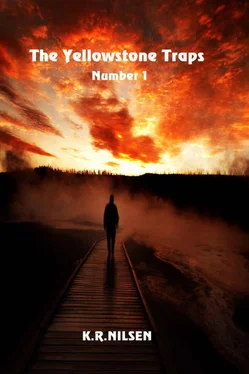A lance of panic pierced Harland’s sensibilities. “Look, you people, I’ve got to leave,” the farmer coughed. “I’ve got to get to town.”
“Don’t fret,” said Abel waving away the farmer’s concerns. “We’ll get you back to town tomorrow. It’s a long pull down to Sweetly. We all need to rest for a day before we make the journey again.”
Checkmated, Harland grew visibly flustered. He cut to the quick and held up his hands, a gesture clearly signaling back off . “Look, mister, you people brought me up here for a reason. You didn’t bring me here to fill my stomach and send me on my merry way. What’s going on? What do you want with me?”
“Very well, Harland, fair questions each,” remarked Abel. “It comes down to this: In the old Sweet Spring brewery there are now tons of grain. Your people in Sweetly need that grain and we need the grain. Here, as you can see, we grow great quantities of all sorts of things, all protected from the elements. We need this food, of course. But, Harland, you and the citizens of Sweetly need it, too. You need it badly. Are you following me?”
Harland responded slowly, uncommitted. “Go ahead.”
“A good deal of what we grow here we sell into the marketplace. We sell big surpluses and generate a steady stream of dollars. But it’s impossible to get the food out to market because of conditions. Wholesalers can’t get in and the whole food distribution system out there is crumbling. Essentially, Yellowstone shut down our business. For all we know, it may be gone for many years, maybe for good. Tons of what we grow is going to waste, but we don’t want to just pull it up and compost it.”
“What are you going to do with all of it, then?” Harland questioned bluntly.
“It should be altogether clear, Harland.” Abel became animated, his hand gestures and facial expressions increasingly exaggerated. He paced around the farmer. “We need people to consume this food, farmer, local people— your people. If they don’t get it, people are going to die. They’ll die of disease. They’ll die of malnutrition. But they don’t have to die.”
“They’re already dying.”
“All the more reason to act right away.”
From another one of the cold frames, the town founder pulled up a large carrot and wiped dirt from the orange root before Harland’s eyes. Abel held it up for all to see. “You have to understand something, Harland. Before Yellowstone disrupted our planting cycle, this town we’ve shown you was almost entirely self-sufficient. We designed it to be that way on purpose, to control our own destiny to the greatest degree. We didn’t need to run to the grocery store every week. We never had to go to the mall. We weren’t dependent on the broader American culture. We weren’t dependent on anyone.”
“About the only thing we didn’t grow was wheat, so we’d bring that in. We’d also buy some citrus and tropical fruits and a few spices we couldn’t grow on the bluffs. But we grew virtually everything else. We were food independent. We had a perfectly sustainable culture going up here. We didn’t eat processed garbage. We had a rich and wholesome diet. And we still do—as you’ve seen—except the weather induced by Yellowstone killed our corn crop and stunted the potato plantings.”
Abel wheeled about before Harland and squared off directly before the farmer, lifting and holding his hands out beyond his shoulders and tipping them up and down as if balancing a scale. “We want to barter our food for your grain, simple as that. You can’t eat corn alone; your illness is proof of that. We need more calories from carbohydrates to see us through up here. In other words, we want corn and soy—the foods you and your fellow farmers down below grew, the grain we pilfered out from under the Guard’s noses and crammed into the brewery. You? You need everything but corn.”
Harland weighed Abel’s words. He had feared a much darker scenario, something that forced him into a blind corner from which he could not retreat. That was not what he was hearing. Abel was offering some sort of cooperative arrangement, something open-ended.
“You’re talking a simple swap? Is that’s what I hear you saying?”
“That’s it, the old barter system. Swap a bushel of this for a bushel of that.”
“No money changes hands?”
“We can’t eat money, Harland. Neither can you.”
“Never liked the taste of it anyway,” Harland said, cracking a toothy smile.
The little aside severed the tension between the parties. Abel and his few cohorts laughed aloud at Harland’s remark. For the first time since arriving on the bluffs among strangers, the farmer felt he could let his guard down a little.
“When would you want to get started?” Harland queried.
A grin brightened Abel’s face. The farmer had arrived at the exact place the town’s founder hoped he would. “Let’s get going as soon as the Guard drives that train out of Sweetly. It will take us a few days to get the logistics down and harvest and pack for shipping. Does that work for you, Harland?”
Harland’s tilted his head back and clamped his eyelids tight to squeeze the fatigue from his eyes. “Yeah, that works, mister.”
Chapter One Hundred-Eleven
Canada Route 2 rolled northward, a strand of grit and tar lost on a table-flat ocean of early fall snow and range stubble. Driving under an icy moondog halo encircling a hazy half moon, Sinopa ferried Liz north to Calgary, humming a tune at the wheel. Slumped in the passenger-side seat, the geophysicist sowed disjointed thoughts. Through the window floated flippered plesiosaurs and mosasaurs, creatures that inhabited the inland Cretaceous sea that had laid down the dead-level sediments sweeping by the car windows. If it would ever warm up again, Canada could at least turn to these tabletop ranges and flat wheat lands to feed itself several times over, Liz speculated.
To stimulate conversation to help pass the three night hours to Calgary, Liz called Sinopa’s name.
“Yes, Elizabeth.”
“What will you do if cold persists next summer? How will you people manage?”
“As we once did,” said Sinopa flatly, eyes fixed tight to the road. “White Elk says the buffalo will provide for us. They eat the grass. No matter what the weather, the grass is immortal.”
“You can’t live on buffalo meat alone.”
“There are a hundred wild plants that provide nourishment, but you must know what they are and where to look for them.”
“Name one.”
“Oh, let’s see, timpsula, the prairie turnip, is a good one. Boil it, bake it, fry it, pickle it, it doesn’t matter. Whites moving into this country called it Indian breadroot. Topeka root, too, is very good, something like potato.”
“I can’t imagine the plants maturing in the cold.”
“These wild plants have always lived with cold weather. They evolved in it. It is nothing to them. They are free for the harvesting. We know them well.”
“You’ve eaten them, then?”
“Of course. Some of us have not forgotten these foods. They have always sustained the Blackfoot in times of hardship. When the Whites murdered the buffalo herds for sport and left us to starve to death, we turned to the wild plants. Without them, we would have perished.”
Several miles of road passed under the car before Sinopa found her voice again. “And what will you do a year from now, Elizabeth? How will you sustain yourself?”
The last smudge of red illuminated the mountains to the west and the hard level edge of the limitless prairie to the east, backlighting dark milk-carton-shaped forms of great, aging wood-sheathed grain elevators rising twenty miles apart. The radio scratched out a single evening radio preacher, steeped in Revelations, broadcasting a warning: “Two of the four horsemen of the Apocalypse were already astride the land in the wake of the Yellowstone disaster. The others would follow soon, very soon.”
Читать дальше










